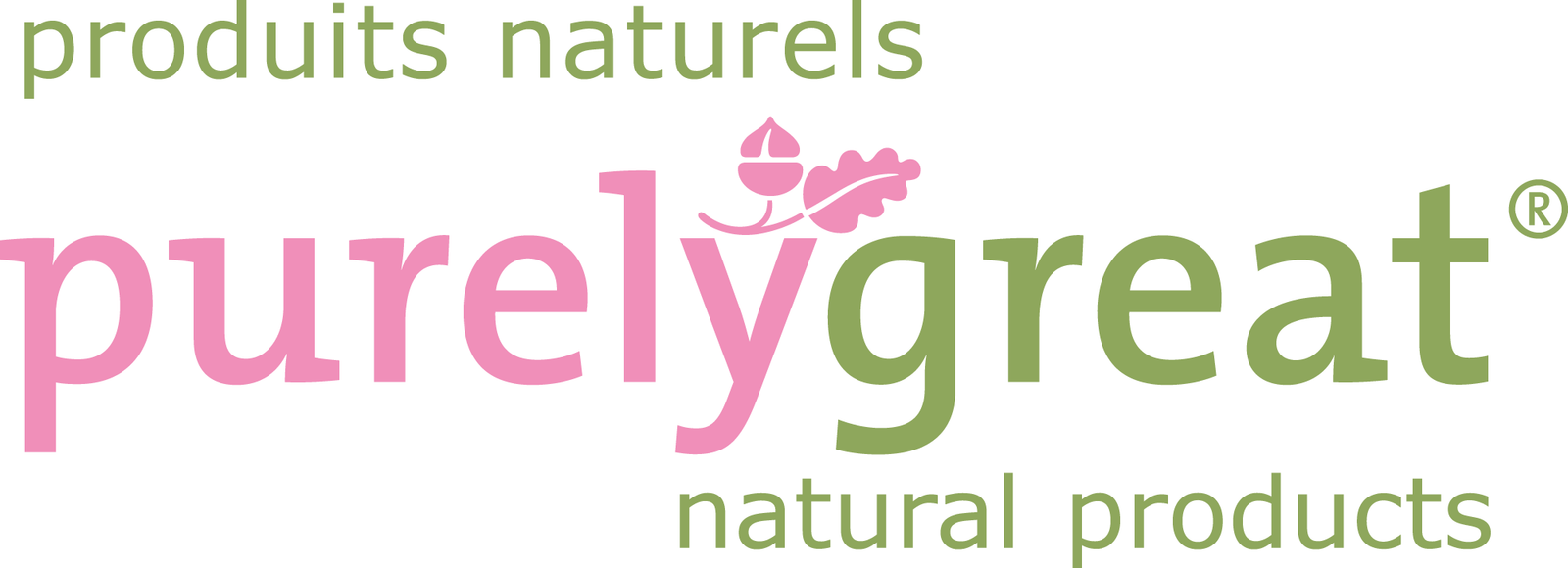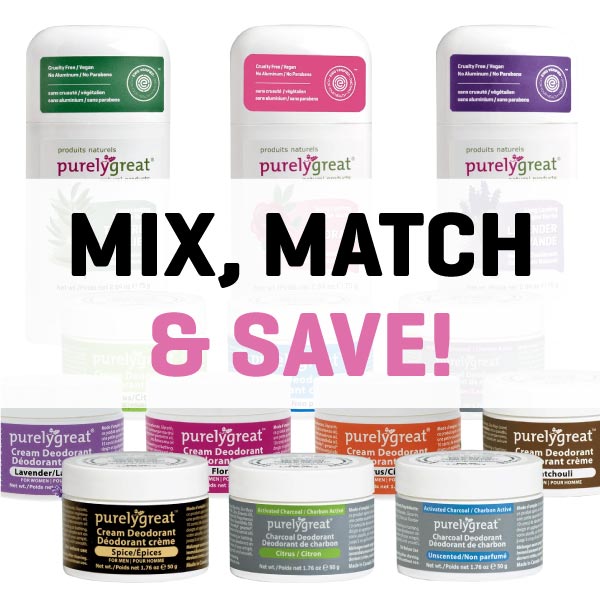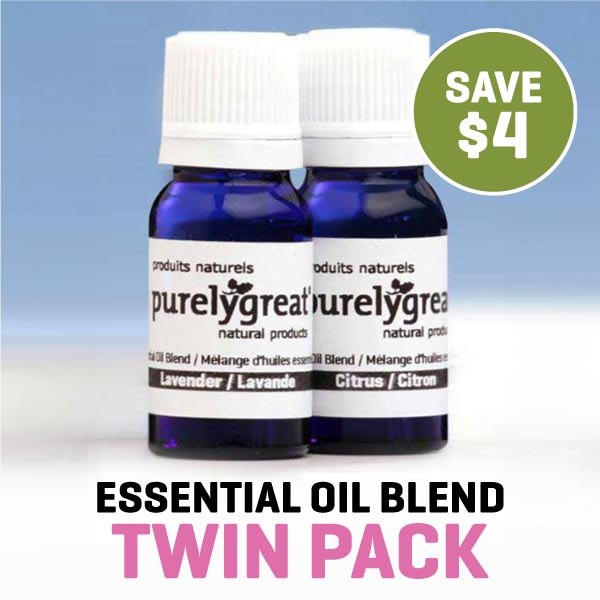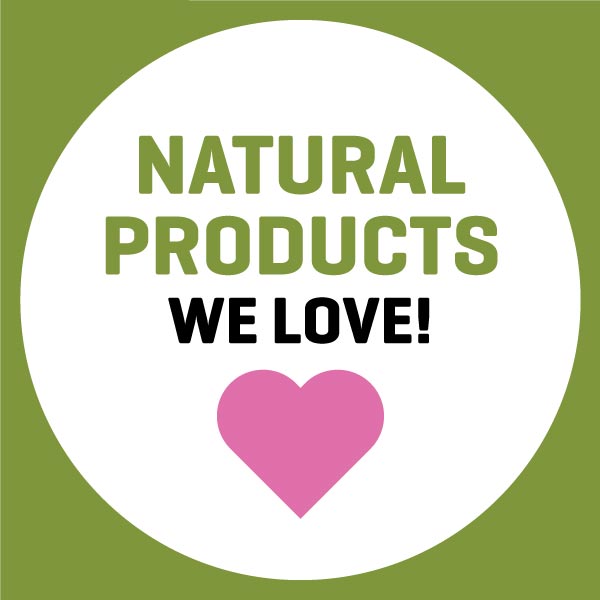Toxins In Your Drugstore Deodorant. We all want to look good, smell good and feel good. But there’s no sense in looking your best if you’re doing so at the expense of your health, or the environment. Many people don’t look very closely at the ingredients in their beauty products. The list is long – shampoos, body wash, baby care products, cosmetics and even your toothpaste may contain ingredients that do more harm than good, both to your body and to the planet. One of the biggest offenders is deodorant. Do you know what toxins in your drugstore deodorant could be doing to you?
Your drugstore deodorant may contain ingredients that cause cancer, respiratory issues, hormonal imbalance and more. And what’s more is that those ingredients are very harmful to the environment as well. They release toxins into the air and the soil, and enter the waterways, causing fragile ecosystems to become imbalanced.
We urge you to find out what’s in your drugstore deodorant. It’s possible that what you’re putting on your body might not be safe for you or the planet. So, let’s take a further look at
10 Toxins In Your Drugstore Deodorant.
1. Steareths
Steareths are one of the the first toxins in your drugstore deodorant. You might see polyoxyethylene 20 stearyl ether on the list of ingredients in your deodorant. If you do, put it right back on the shelf where it came from. Steareths are chemical compounds used a few different ways in drugstore deodorants and other health and beauty products. They may be used as emulsifiers (agents used to combine ingredients), or as a thickener or a cleansing agent. Stearic acid, itself, is fairly benign. But steareths are made by combining stearic acid with ethylene oxide, which is a known carcinogen. After the steareths are made, some of the ethylene oxide remains, which means that steareths are now no longer innocuous and contain cancer-causing ingredients. You’ll find steareths in many drugstore deodorants, as well as in lotions, face and body washes and even in your food, like salad dressing. In addition to having carcinogenic effects, steareths are also eco-hazards. When disposed of, they enter the waterways and cause significant damage to natural environments. Steareths as an emulsifier are easy to avoid. Simply choose a product that contains a natural emulsifier, like beeswax or candelilla wax. Alternatively, choose a product that doesn’t have an emulsifier at all, and just stir the product before you use it!
2. Aluminum Compounds
Next on the list of toxins in your drugstore deodorant are aluminum compounds. Aluminum compounds are found in more drug store antiperspirants because they’re the ingredient that makes you not sweat. Aluminum compounds clog your pores, blocking your body’s ability to perspire. Perspiration is essential to maintaining healthy skin. As you sweat, you’ll regulate your body temperature and release toxins from your body. You’ll also kill bacteria and viruses that live on the surface of your skin. When you block your body’s ability to sweat, you open yourself up to a number of skin infections, conditions and health concerns. But, if that’s not enough to convince you of the risks of aluminum compounds, consider what aluminum itself will do to your body. Aluminum compounds are absorbed into the body through the very sweat glands they’re meant to block. And the substances have long been thought to carry the risk of cancer, in particular, breast cancer. They’ve also been linked to Alzheimer’s, as well as interference with hormonal balance. For your best health, avoid antiperspirants entirely. Your body needs to sweat; blocking the sweat glands that help you regulate your skin’s healthy balance will absolutely do more harm than good. The secondary effects of aluminum compounds are just the icing on the cake.
3. Parabens
You’ve probably heard of parabens. In fact, today you’ll see a lot of products that are advertised as paraben-free. That’s a good thing, as parabens are closely associated with some serious health risks. Parabens are often added to products to prevent the growth of mold and bacteria. They’re not just found as a toxin in your drugstore deodorant, either. You’ll see parabens listed in the ingredients of shampoo, soap, lotion, sunscreen and shaving products, too. So what do they do? Parabens mimic estrogen in your body. This is true for both men and women. This “synthetic” estrogen can build up in the body, causing breast cancer and prostate cancer. This estrogen effect can also cause problems with the reproductive system, including fertility problems. Finding alternatives to parabens is easy. In fact, nature offers many natural preservatives which are not harmful to your health. Sodium benzoate, for instance, is all natural and has no known side effects. Certain essential oils also act as natural preservatives and are included by manufacturers of health and beauty care products. Thankfully, more and more manufacturers are turning away from parabens as a preservative, and opting instead for more health and eco-friendly alternatives. Before you buy any product, though, be sure that it’s paraben-free.
4. Triclosan
Triclosan is one of the most harmful toxins in your drugstore deodorant and other beauty products. In fact, the chemical is banned or strictly limited in many countries. In the USA, it’s no longer allowed as an ingredient in antiseptic products. In Canada, it’s still allowed but in small amounts in mouthwashes, non-prescription products and cosmetics.Triclosan, prior to the many studies which were conducted, triclosan was found in many cosmetics and home products. Of course, deodorants often contained the chemical. But you could also buy hand sanitizer containing triclosan as well as hand washes, shampoos and even home cleaning products. Why has triclosan become so strictly regulated? There are a few reasons! First, when triclosan is mixed with city (chlorinated) water it can release a highly carcinogenic gas called chloroform. The chemical can also interfere with hormones, causing fertility issues and certain types of cancers. The second reason is that triclosan has a huge environmental impact. Not only does it interfere with the fertility of humans, it also has a similar effect on wildlife, in particular throughout the waterways. Triclosan has been classified in the United States as a pesticide because of these powerful effects. Triclosan is proven to have adverse effects on fish. It causes developmental problems, as well as reproductive problems. And, to make matters worse, the chemical can never be completely removed during the water treatment process. As with most toxins, there are certainly natural alternatives! Many essential oils, for instance, have antibacterial properties. And for household cleaning products, ingredients as commonplace as lemon juice and vinegar are a great substitute for triclosan.
5 & 6 Toxins In Your Drugstore Deodorant: TEA and DEA
TEA and DEA are known toxins in drugstore deodorant. Like steareths, TEA and DEA are often added to beauty care products as an emulsifier. And like steareths, they have some serious health risks associated with them.TEA and DEA are in a class of chemicals called ethanolamines. And, while they’re frequently added to your drugstore deodorant and your shampoos, they also have more industrial purposes: TEA and DEA are used as corrosion inhibitors in airplane engine coolant and antifreeze.With prolonged use, TEA and DEA are proven to increase your risk of cancer. This is particularly true for cancers of the liver and kidneys. In fact, TEA and DEA have been banned in some parts of the world – the UK, for example – because they’re so harmful to health. As with most of the toxins in your drugstore deodorants, TEA and DEA are very harmful to the environment. They’re proven to be toxic to aquatic life. And, similarly to triclosan, the chemicals can build up in the waterways, becoming highly dangerous to the environment.
7. “Fragrance”
Almost every product you’ll buy at the drug store contains an ingredient called “fragrance.” It sounds pretty harmless, right? That’s not necessarily true. See, because of the percentage of these chemicals as a part of the whole product, manufacturers are allowed to simply list “fragrance” as an ingredient on products. However, this one ingredient may contain dozens of individual chemicals. According to the EWG, the Environmental Working Group, the average fragrance contains about 14 ingredients. Around 80% of these ingredients have never been safety tested for human use. Need a sampling of those ingredients? Your drugstore deodorant may contain:
• Formaldehyde
• Methylene chloride
• Acetone
• Phthalates
• Benzaldehyde
• Camphor
As you’ll notice, some of those ingredients are carcinogenic. Others cause respiratory distress. And still others, like camphor, can be fatal. When you see words like fragrance, perfume, parfum or artificial fragrance listed on your drug store deodorant, put it back. Instead, opt for deodorants which contain natural essential oils. Or, choose an unscented product!
8. Phthalates
We mentioned that phthalates can be a hidden toxin in your drug store deodorant, as they’re frequently listed under the umbrella term “fragrance.” However, phthalates are very harmful, and they deserve a mention of their own. Phthalates are added to fragrance in deodorants, but also to help your deodorant spread more smoothly. However, they have some serious health risks. Phthalates have been linked to breast, ovarian and prostate cancer. They’ve been known to cause endocrine disruption. They cause liver, lung and kidney damage, as well as decreased sperm count and infertility. Phthalates aren’t just harmful to humans, either. Like other ingredients on this list, they’re released into the environment and have a severe impact on aquatic systems. Fish fertility is affected, and the impact is long-lasting. Phthalates are usually recognizable in a list of ingredients as a series of letters, such as BBP, DEP, DiNP and more. However, remember that phthalates can be included in the fragrance, so be sure to avoid artificial fragrance, too.
9. Propylene glycol
Propylene glycol is another of the toxic chemicals found in drugstore deodorants. In fact, some drugstore deodorants can contain as much as 50% concentration of this chemical! Why is this a problem? Because propylene glycol has some very negative side effects.Propylene glycol has been known, with prolonged use, to cause seizures, central nervous depression, coma, renal failure and hypoglycemia. In the mildest cases of interaction, propylene glycol causes allergic reactions on the skin. Suddenly, with those risks, your drug store deodorant may not seem worth the risks! Propylene glycol can be added to your cosmetics for a number of reasons. First, it’s an emulsifier. It’s also a surfactant, which means not only emulsification but also a smooth application of your deodorant. Finally, propylene glycol may be added to your deodorant as a drying agent. Be sure to avoid propylene glycol when you shop for your deodorant. Of course, the best alternative to propylene glycol is simply to choose a natural deodorant like PurelyGreat!
10. Additives
As you read the list of ingredients in your drug store deodorant, you may find that there are some seemingly harmless looking ingredients. However, we’d encourage you to look a little further. Take talc, for instance. Talc in an of itself is being studied for its carcinogenic effects. In addition to the potential risks of talc, however, there’s the risk that your talc may be contaminated with asbestos. And silica, too, is frequently added to deodorant. Silica is a known skin irritant and may be contaminated with crystalline quartz. Crystalline quartz has been found to cause cancer.
Avoiding Toxins in Your Drugstore Deodorant
There’s a very simple way to avoid toxins in drugstore deodorant: buy natural deodorant. Natural deodorants like the ones we make here at Purelygreat contain no harsh chemicals and toxins, which means that, if they’re absorbed into your body, they’ll do you absolutely no harm.
Purelygreat deodorant is natural, vegan, and verified by the EWG. There’s no triclosan, no parabens, no phthalates and none of the other toxins you can expect from drugstore deodorants. So how do the products work? Natural ingredients contain a number of ingredients with proven efficacy.
Natural deodorants are not antiperspirants. That is to say that you will sweat a bit. However, as mentioned, sweating is your body’s natural way of eliminating toxins, regulating body temperature and killing harmful bacteria. In other words, sweating is a good thing.
Body odour associated with sweating isn’t actually caused by sweat. Sweat doesn’t smell bad. Instead, body odour is caused by that sweat coming into contact with the bacteria on your body. And that’s how natural deodorants work. They kill the bacteria on your body, leaving you smelling great whether you’ve just woken up or just hit the gym.
What’s more is that natural deodorants contain safe alternatives to the harmful and carcinogenic substances found in drugstore deodorants.
Baking soda works to neutralize odour and kill bacteria on your skin, leaving you smelling like you’ve just stepped out of the shower. Sodium stearoyl lactylate is a natural emulsifier which provides smooth application and prevents separation of ingredients.
Natural deodorants can be purchased as unscented or can contain natural fragrances. And scented natural deodorants often have benefits of their own. They contain essential oils, which can have antibacterial properties or other benefits to your skin. For instance, lavender will help heal skin, which can mean less irritation from shaving.
Look for charcoal in your deodorant, too! Charcoal is a natural detoxifying agent, which draws impurities from your skin (and your armpits), providing even further protection.
Getting Started with Natural Deodorant
Getting started with natural deodorant is just as simple as it sounds. All you need to do is get started! Choose a fragrance you like, or opt for unscented, and apply as frequently as you would your drugstore deodorant.
If you choose, you may wish to detox your armpits before beginning to use natural deodorant. There are marked benefits to doing so. In fact, as you remove those toxins from your body, you’re balancing the chemicals in your sweat, making your natural deodorant work that much better to combat body odour.
When you first use a natural deodorant, you may notice that you sweat a little more for the first few days. That’s okay; it’s normal. This is caused by a buildup in your glands which was previously blocked by antiperspirant, and by the chemicals in your drugstore deodorant.
Switching to a natural deodorant is one of the best things you can do to improve your beauty routine. Eliminating the toxins you’re exposed to may help to reduce your risk of respiratory disease, skin issues, liver and kidney problems, reproductive issues and even cancer.
Make the switch today, and see how you like natural deodorant for yourself! You’ll not only be doing good for your body, but you’ll also be doing good for the planet!







